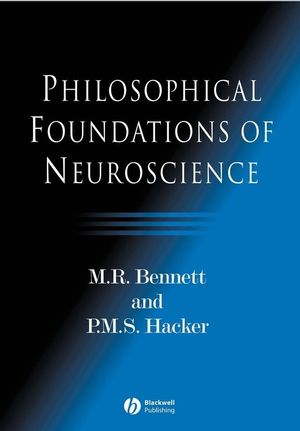Philosophical Foundations of NeuroscienceISBN: 978-1-4051-0838-6
Paperback
480 pages
April 2003, Wiley-Blackwell
 This is a Print-on-Demand title. It will be printed specifically to fill your order. Please allow an additional 10-15 days delivery time. The book is not returnable.
|
||||||
“This book was simply waiting to be written.”
Denis Noble, Oxford University
“Contemporary scientists and philosophers may not like
Bennett and Hacker's conclusions, but they will hardly be able to
ignore them. The work is a formidable achievement.” John
Cottingham, Professor of Philosophy, Reading University
“Neuroscientists, psychologists and philosophers will be
challenged – and educated – by this sustained and
well-informed critique.” Paul Harris, Professor,
Human Development and Psychology, Graduate School of Education,
Harvard University
"This book is a joy to read. It is the fruit of collaboration
across disciplines and continents between a neurophysiologist and a
philosopher. They have written a polemical work that is a model of
clarity and directness. Distiniguished neurophysiologist M.R.
Bennett of the University of Sydney, and eminent Oxford philosopher
P.M.S. Hacker have produced that rarity of scholarship, a genuinely
interdisciplinary work that succeeds. ... This is a wonderful book
that will illuminate, provoke and delight professional scientists,
philosophers and general readers alike." Australian Book
Review
"Bennett and Hacker have identified [conceptual confusions] with
clinical precision and relentless good sense.... rich with
philosophical insights ... thoughtful and wonderfully useful
treatise ..." Philosophy
"careful application in a host of cases ...is precisely what
Bennett and Hacker provide in devastating critiques of
psychologists and neuroscientists such as Blakemore, Crick,
Damasio, Edelman, Gazzaniga, Kandel, Kosslyn, LeDoux, Penrose and
Weiskrantz; and they also raise equally disturbing questions for
philosophers such as Dennett, the Churchlands, Chalmers, Nagel and
Searle. Whether this book leads to a reconfiguring of contemporary
neuroscience and the philosophy associated with it will tell us
much about the dynamics of contemporary intellectual life."
Philosophy
"The vast spectrum of material in philosophy and neuroscience
that Bennett and Hacker consider is impressive and their discussion
is thorough and illuminating." Human Nature Review
1. ‘[It] will certainly, for a long time to come, be
the most important contribution to the mind-body problem which
there is.’ G. H. von Wright
2. ‘everyone who thinks about the mind and
consciousness should study Philosophical Foundations of
Neurtoscience. ... it will ultimately contribute to a far better
understanding of mind and consciousness within scientific thought
as well as a better understanding of the limits of empirical
investigation’, Arthur Collins, The Philosophical Quarterly,
2004
3. ‘Sweeping, argumentative and brilliant, this book
will provoke widespread discussion among philosophers and
neuroscientists alike’, Dennis Patterson, Notre Dame
Philosophical Review, 2003
4. ‘...devastating critiques of psychologists and
neuroscientists ... Whether this book leads to a reconfiguring of
contemporary neuroscience and the philosophy associated with it
will tell us much about the dynamics of contemporary intellectual
life’, Anthony O’Hear, Philosophy 2003
5. ‘This book is a joy to read. ... a model of clarity
and directedness... [Bennett and Hacker] have produced that rarity
of scholarship, a genuinely interdisciplinary work that succeeds.
... This is a wonderful book that will illuminate, provoke and
delight professional scientists, philosophers and general readers
alike.’, Damian Grace, Australian Book Review, 2003
6. ‘clinical precision and ... relentless good sense
... [a] thoughtful and wonderfully useful treatise’, Daniel
N. Robinson, Philosophical Quarterly, 2004
7. ‘mandatory reading for anybody interested in
neuroscience and consciousness research. The vast spectrum of
material in philosophy and neuroscience that Bennett and Hacker
consider is impressive and their discussion is thorough and
illuminating.’ Axel Kohler, Human Nature Review,
2003
8. ‘a delicious cake of a book in which Bennett and
Hacker guide the reader through a conceptual minefield of
confusions repeatedly made by neuroscientists and philosophers
alike.’ Constantine Sandis, Metapsychology 2003
9. ‘Anyone who has ever framed a theory or explained
one should read this book ‑ at the risk of forever falling
silent.’, The Rector, University of Sydney, Obiter Dicta
2003
10. ‘... impressively lucid ... Bennett and Hacker
unquestionably succeed in making us challenge our own concepts,
examine them for dross, and strive to home in on
fundamentals.’ Neil Spurway, Journal of the European Soc for
Study of Science and Theology.
11. ‘...the fruit of a unique cooperation between a
neuroscientist and a philosopher ... an excellent book that should
be read by all philosophers of cognition and all researchers in the
cognitive neurosciences.’ Herman Philipse, ABG #2, De
Academische Boekengids 2003
12. `...there are, I think, grounds for hope that this book will do an enormous amount of good, both in correcting philosophical confusion within neuroscience and in promoting a new style of dialogue between neuroscience and philosophy' David Cockburn, Philosophical Investigations, 2005



